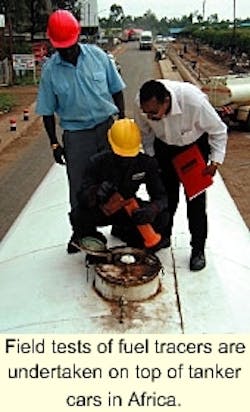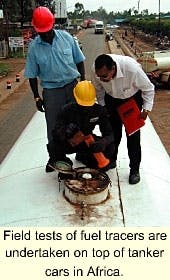Encoded fuels
Unscrupulous East African fuel traders who have illegally dumped tax-free fuel back onto the Kenyan market for years are rethinking their business strategies. Implementation of a chemical tracer in retail fuels and random testing can now identify tax-free fuels and the culprits responsible for returning these fuels to the Kenyan market.
Although the success of the project is ultimately linked to prosecution of the perpetrators of fuel diversion, early results show that overall incidents of export dumping have fallen by more than 80%.
In Kenya
In Kenya, exported fuel is not taxed, making it cheaper than the pump price. Thus, fuel traders find it profitable to sell this fuel back into the Kenyan market.
This dumped fuel displaces taxed fuel from legitimate oil companies. The dumping practice deprives both the Kenyan government of taxes and oil companies of domestic fuel sales.
Since June 1999, the government of Kenya has inserted a biocoded marker into its fuels to designate fuel for local consumption or for export. Using simple test kits, inspectors randomly analyze the fuels at retail sites for these markers.
Before implementation of the chemical marker, 10% of retail sites were receiving illegal fuel, said Biocode UK, the York, UK, company that provides the biocoded solution. Putting the system in place has reduced illicit trade, recovering $30 million in taxes for the Kenyan government and $50 million in sales for oil companies, said the company.
Traders have also taken advantage of the tax structures that differ between tax-free kerosine and taxed motor fuels to chase illegal profits. Adding kerosine to diesel or gasoline creates a poor quality motor fuel that can damage vehicles. Since the implementation of the marker project for kerosine, the Kenyan government has recouped $15 million in taxes, and legitimate companies have benefited by $25 million.
Uganda, Tanzania
Uganda and Tanzania have also added the chemical tracer to their domestic fuel to identify and protect it from smuggling.
Uganda marked its fuel for a trial 7-month period in 1999. After evaluating this trial period, the government enacted legislation and relaunched the program in November 2000. By inspecting retail sites, it is possible to determine whether there has been dilution with smuggled (unmarked) fuel.
Using the tracer, the government expects to save $2 million/month, and oil companies expect to gain $1.3 million/ month-revenues suggested by the pilot scheme.
The Tanzania Revenue Authority has required all imported fuels to be marked since this past January. Smuggling and dumping has cost the Tanzanian government up to $30 million in lost taxes and deprived oil companies of $60 million in sales.
In general, governments can expect the projects to cost 1% of the savings, said Biocode.
The marker
In each case, Biocode worked with Geneva-based inspection firm Sté. Générale de Surveillance (SGS), which provided the infrastructure for marker sampling and analysis.
The marker is a harmless, inert solution added to the fuel at a concentration of 50-500 ppb. The covert chemical signature is made of two components: a lock and a key.
All genuine products bear the chemical signature, or lock. Field teams can check the authenticity of the goods by matching a key with the lock. The lock and key are virtually impossible to crack, said Biocode, as it would require massive investment and expertise.
In the petrochemical industry, the company is currently discussing the use of its product with Kenyan authorities for methanol tracing. It is touting its product as the solution for finding untaxed methanol that has found its way into alcoholic beverages.
Methanol is a poison when consumed by humans. Late last year, about 140 people died after consuming alcoholic beverages brewed with methanol in Kenya. This is an ongoing problem in Kenya, because the diversion of methanol from the industrial chemical sector, where it is taxed, is profitable for traders.
What's next for the lock-and-key solution? Any application that defends brands, government revenues, and people against piracy, says Biocode. Besides expanding its fuel applications, it is looking into the pharmaceutical, machine parts, and wines and spirits markets.
null

